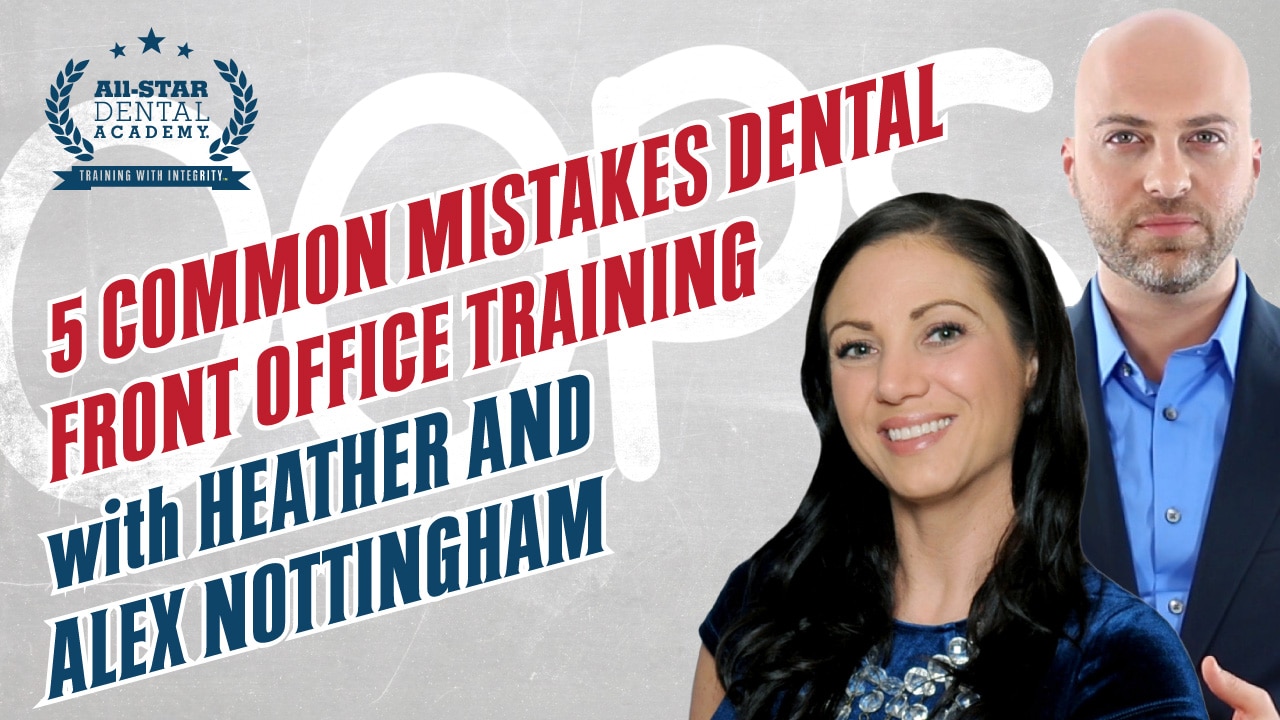

Every role in the office is important in a dental practice, but success starts and ends with the dental front office training. The front office represents the practice to potential patients who call in. It’s where your existing patient’s schedule appointments, and the source of those pesky cancellations, late appointments, and no-shows (who likes those, right!?)
It’s also where (typically) money flows in – a critical part of the business. But it’s interesting that we are likely to find the lowest paid and least trained employees in the practice of running the front desk.
There are formal training programs for hygienists and assistants, but little systematic training is available for the dental front office team.
The tricky part is to find a program that fits the vision and culture of your practice, has a proven record, and will be taken up by the front office team with enthusiasm. …
Watch Alex Nottingham and Heather Nottingham discuss the 5 Common Mistakes with Dental Front Office Training:
Here are five common mistakes to avoid when considering a dental front office training program:
Marathon training sessions are a big problem that we see all the time. Seminars are fun for team building (hey, we even do live seminars ourselves); however, day-long lectures are not ideal for maximum information retention and implementation… two of the biggest issues dental front office teams encounter with dental front office training.
Going to an all-day seminar is not only long and tiring but most of the time the team brings back little to no information that is going to create any lasting change for their office.
Alex Nottingham, our CEO and Founder, was once a struggling student who got into university on academic probation due to lower than preferred SAT scores. That didn’t stop him. He figured out the best and most efficient way to study was in short, bite-sized sessions EVERY DAY. Alex not only began to excel in class, but eventually, he became a study skills specialist, helped other students, and graduated Suma Cum Laude.
Alex’s experience, and lots of academic research, shows that information is more effectively absorbed when presented in smaller pieces and accompanied by practice and repetition. This approach to learning is the basis for a successful dental front office training excuses program… short, systematic sessions each week (every week, consistently!) results in maximum retention.

There is a big difference between watching videos/content/hearing a lecture and mastering a skill. Imagine if you wanted to learn a new language. Do you think the typical person would be able to read a textbook once or watch a handful of videos and then be able to speak fluently? Probably not.
It’s the same for skills learned in dental front office training. Training Program videos need to be short, so they are easy to watch. And the program must be built as a “how-to,” step by step system. After viewing the video lesson, it is critical that the team discuss the concept(s) from the lesson, practice, role play, and implement what they learned in their day to day work with patients.
It is common knowledge the key to actually mastering a skill is repetition. Some experts on learning say 10,000 hours are required to master a set of skills. We’re not sure about that, but we do know that constant practice and implementing new skills when working with patients will lead to mastery.
Additionally, we suggest getting re-certified on a Training Program (especially rapport building from Phone Success) every year to uncover subtleties and to keep skills fresh.

Think all dental front office training is created equal? Nope. Often, when a dentist is selecting a program for their dental front office team, they don’t know what to look for, and they get lead down the wrong path. An unfortunate truth is many “training” companies promote a “Get ‘em in” approach where the team is trained to do or say whatever it takes to get a new patient to make an appointment.
A “Get ‘em in” approach almost always has mixed results: your new patient numbers may go up, but so do your no-shows and cancellations. And the patients that do show up often have the wrong expectations about insurance and the cost of treatment (dental insurance training). And those patients that are happy with their experience are often not the type of patient you really want to attract.
And finally, even if your team can bring in more patients, this type of training is toxic and can cause tension between the Dr. and the team. Not a good formula for happy patients and a successful practice.
Instead, look for a program that emphasizes service and patient experience – two areas that are proven to create long-term, mutually beneficial relationships between practice and patient.

One sneaky sales tool of “training” companies is a “mystery call” that sets your team up for a difficult call. Then they try to sell you their program by highlighting the “failures” of your team.
The real problem with this is that I can guarantee I could write a script that would lead to failure for ANYONE answering the phone. So, the typical “mystery call” is not exactly a legitimate measurement of performance.
Now, recording and evaluating patient calls is an extremely powerful tool to measure the effectiveness of your front office team. BUT, call evaluations need to be done in a constructive and positive manner, using REAL patient calls, and avoiding the contrivance of “secret shoppers.”
We encourage all of our clients to record patient calls and self-grade, but for those that need an outside perspective, your training company should provide a call-grading service. With our clients we listen to recorded patient calls and provide a grade and, more importantly, feedback for improving patient interaction skills. Call grading of real calls is truly an invaluable training tool.

Many practices turn to scripts in a misguided attempt to cure dental front office customer interaction woes. I say misguided because this approach is often taught by well-meaning but ill-informed trainers. The problems with this approach are numerous, but they start with dissatisfaction in employees required to use them. And unhappy employees generally don’t perform to their potential.
Also, and more importantly, employees using scripts are often less imaginative and empathetic about a patient’s true needs.
If you want your patients to trust your practice, your front-line employees must be able to foster a friendly and professional connection – something scripts just won’t allow.
To successfully build that connection, an effective training program focuses on and supports a “patient service” vision or philosophy. Work with your staff to commit to creating value and memorable experiences for patients. Teach your team to first appreciate a patient’s concerns, fears, worries, and needs, and then take appropriate action. This is the type of training that will encourage true success – scripts will never match it.
Avoiding these five common mistakes will ensure that you are investing you and your team’s time and energy, and the practice’s money, in the right kind of dental front office training. Get it right, and your team and your practice will thrive.
Dental office phone training can prove an effective means of enhancing patient satisfaction. Provide your front office staff with the necessary dental scheduling training and make them valuable members of your business. Invest in virtual training to make the process convenient for all employees, without restrictions on time or space.